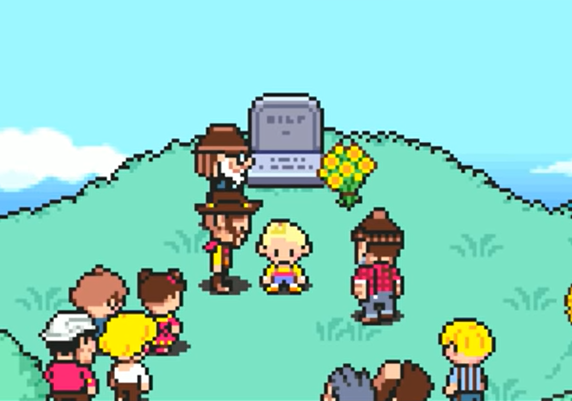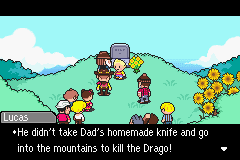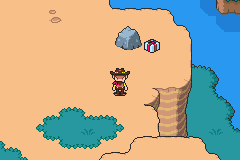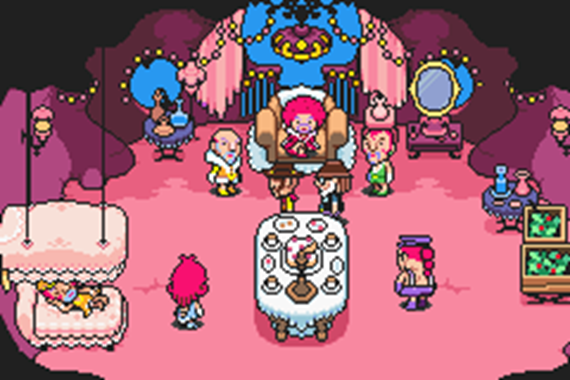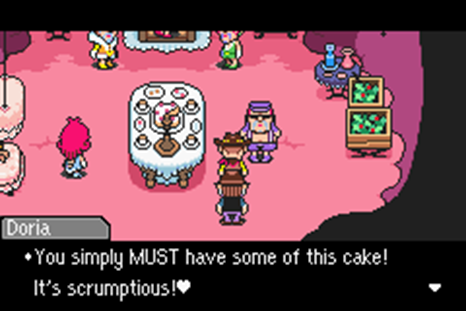Part 5: The Next Day
After Flint breaks out of jail, you’re free once again to explore Tazmily and hear the thoughts of all its inhabitants. Funnily enough, only one person in the whole town mentions Flint’s imprisonment, but even he doesn’t ask how he got out. One of the first people you find are Bud and Lou, who are practicing their comedy routine, discussing how it can be improved upon. Caroline tells Flint to cheer up, and that it’s what Hinawa would want him to do. Since the urgency of a fire is over, you are now able to enter people’s homes and talk to the them inside, a common occurrence in RPGs. Since this is a video game, and the order of events is a lot more flexible, the player has to walk up to each character to hear their thoughts, rather than having them approach the player. This is why they are all so blunt, like Nana, who says: “I’m Nana. I like the ocean.” The game simply doesn’t have time to elaborate on each character. If it did, the game would draw out much, much longer. This is also why you are able to barge into houses at any time without anybody batting an eye. The player almost has an omnipotent quality in games like these in order for them to understand the world better.
If you choose to go back to Flint’s house, the game will acknowledge the fact that there is no longer a doorknob, before allowing you to enter. There is nothing different about the house other than that. I think there was a missed opportunity to have Flint reminisce of the items that Hinawa had used, but perhaps that would have been too much.
One thing about this game that I appreciate is the diversity of opinions each character has. While the majority of townsfolk say things along the lines of “I’m sorry for what happened, but try to lighten up; it’s all you can do,” Elmore says, “I understand how you must be feeling. But please don’t lash out at those around you.” Ollie, one of the people who Flint has attacked, has forgiven Flint, but Elmore seems to be a little more unforgiving. Take it how you want; these differences in opinions are meant for the player to reflect and think “which opinion is the right one?” The game gives moral ambiguity to the dialogue of most characters.
When you enter Wess’s house, he gives some very interesting dialogue: “I won’t stop you. I have an inkling of where you’re off to. But your life’s not the only one at risk here. Old Nippolyte is getting up there in years. Don’t make him dig another grave. Always remember this: your life isn’t yours alone.” Where might Flint be off to?
A favorite bit of dialogue at this point of the game comes from an old man named Scamp, lying down in his bed next to his pet parrot. He says, “I’m Scamp. Something’s not right happening to this village. I can feel it… But that’s just me talking to myself. Oh, Flint! Good of you to come! You weren’t the one who taught my cute little Myrna all those unsavory words, were you?” With the parrot saying, “I’m not stuffed! I’m alive! I’m plenty alive, dagnabbit!”
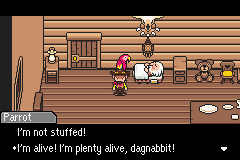
I think it’s interesting how Itoi gives old man Scamp the intuition of knowing something’s wrong in the village; it follows the “old and wise” type, that old, experienced people do indeed have something to contribute. If you recall to when Flint went to look for Hinawa, old man Wess, who just warned Flint, was also able to accompany him and everyone else on the search for his family, despite not being allowed to do that.
Going along the theme of wisdom, you can talk to Reggie, a man dressed in a tribal outfit who lives in a teepee. Why is he that way, when no one else in Tazmily is? I do not know why. Itoi doesn’t seem to be trying to poke fun at him, as he gives him some profound dialogue throughout the game. In this moment, he says, “We can forget happy things. We can probably forget sad things, too. People have the power to forget.”
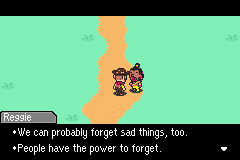
One interesting building in particular is Thomas’s Bazaar. Inside of it, you are able to simply take anything you want from it, free of charge. On the right, there is a shelf with bread on it. The game says that employees can eat it whenever they’re feeling hungry. Tazmily sure is laid back!
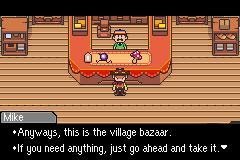
To progress the story, the player must visit the cemetery. The first person you find there is Nippolyte, the grave digger. He says he prepared the finest-quality grave for Hinawa. As you come closer to her grave, you come across nearly everyone in the village grieving for her. She truly was someone special, making the situation all the sadder. There is a collection of sunflowers on the side, which were Hinawa’s favorite. Lucas is still here, as some of the townsfolk have foreshadowed.
Alec, who came all the way down from the mountains for the first time in a while, is also here. He is curious, like everyone else, about where Claus ran off to. Therefore, he asks Lucas. Initially, he says he doesn’t know where he went. However, after asking him a second time, inferring that Claus went to kill the Drago that had slain his mother, Lucas says, “N-n-n-no! He didn’t take Dad’s homemade knife and go into the mountains to kill the Drago!” Lucas tells the truth, despite trying his hardest not to. Alec chastises him for not stopping him, before Lucas runs away in tears. Once again, Flint is on a race against time to save his family. Alec tells Flint to gear up and meet him at his house in the mountains.
If the player never came to Bronson’s house to receive the weaponized Drago fang, he will have waited at the front of the Sunshine forest to give it to him, which is on the way to Alec’s house. He tells Flint that the only thing that can hurt a Drago is another Drago, so this fang will be Flint’s only defense. It seems like he might have to face the beast who ruined his life. On the way to Alec’s house, you can fight more of the flying mice that you saw at Lighter and Fuel’s log cabin; their numbers are on the rise. Along the way, you’ll have to fight against wild moles, boars, and lizards disguised as rocks.
When you reach his house, Alec remarks that it wasn’t always so hard to pass through the forest, questioning what the mice with wings were. He says that according to his ‘froggy intelligence’ (remember that he told the player to save the game by talking to frogs), Claus went to a friend of Alec’s house. Flint and Alec join together to go there. As well as being able to talk to frogs, Alec can also talk to conveniently arrow-shaped lizards, which point in the direction you need to go.
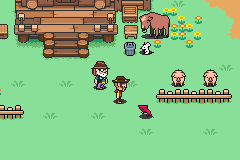
Along the way, Alec will interrupt Flint, each time starting with “Flint…” The first interruption is, “Flint… You have doubts about this friend of mine, don’t you? My friend – no, friends – are known as ‘Magypsies.’ They’ve lived isolated away from civilization for a very, very long time.” The second interruption is, “Flint… It seems you’re not walking as fast now. It seems the word ‘Magypsies’ has made you curious. The Magypsies have mysterious powers, and have been protecting something here for a very long time. They’re neither man nor beast, neither man nor woman. I have no idea how old they are. That explanation didn’t explain much, did it? Basically, they’re strange. All of them. Every one of them. That’s just how they are. They are good-natured, though.” Who are these Magypsies? What are we supposed to expect of them? Well, this is what we are supposed to expect from them:
It wasn’t what you were expecting, was it? On the first impression alone, you see that the Magypsies act and dress extremely feminine, while having masculine bodies. When you talk to Ionia, he will introduce you to the rest of the Magypsies, who are all conveniently having a party at Aeolia’s house that day. Interestingly, each of them are named after modes in music: Aeolia, Doria, Phrygia, Lydia, Myxolidia, Ionia, and Locria, who is not present. Even more interestingly is that the Locrian scale is generally regarded as ‘dissonant’ or ‘dark’ within music theory, and is less used because of its attributes. When Alec asks Aeolia where Claus is, he is distracted by how much Claus looked like Flint, realizing that he is his father.
When Alec gets him back on track, he says “He was in a great hurry, mentioning something about avenging his mother. I was feeling generous at the time, so I sent him away with a super-powerful PSI technique. I doubt he’ll be able to use it very easily, though.” PSI must be the ‘mysterious powers’ that Alec was talking about. Alec is frustrated that Aeolia would let Claus do such a dangerous thing and equip him to fight the Drago.
Mixolydia, however, says, “Oh, get over yourself. We couldn’t care less about you humans, here one minute and gone the next.”
Phrygia adds, “You poor things barely live a hundred years, if that!” That’s a blink of an eye to us Magypsies. Why would anyone bother to care about such short lives?”
Doria further adds, “Now, now! Mixolydia! Phrygia! Humans worry about such short lives. Isn’t that right, Alecy-poo? I understand how you feel. I really do.”
Alec responds, “I don’t care if you understand or not! Just tell us where Claus went!”
Aeolia answers, “The boy headed to the Drago Plateau. Quite rambunctious, I may add. Barely seemed concerned about his own short little life. You may still catch him in time.” Alec then urges Flint to hurry to the Drago Plateau, and they go on their way.
Let’s digest all that now. Alec says the Magypsies are “neither man nor beast,” but I think their appearance makes them look way more like man than beast. Are there people like the Magypsies in real life? There sure are. As stated earlier, Mother 3 likes to show you diverse points of view, and lets you reflect upon them. This isn’t an ordinary game, where everything leans heavily on one ideology. In an interview, Itoi says that he knows some people like Magypsies in real life, and wanted to include them in the game – simple as that. Itoi wants to expose the player to all sorts of different kinds of people, as we saw with Reggie. However, some of these representations don’t seem fair. Reggie’s appearance, home, and way of speaking are so extremely disconnected from everyone else, it seems like a stereotype. The Magypsies are the same way, as they all have pink hair and have heart emojis after most of their lines, whilst still having a very masculine appearance. The kind of person that Itoi is referring to is very clear. However, in his defense, everything in this game is extremely blunt. Characters make no effort to conceal their thoughts. The point isn’t that you need to try to read between the lines; the point is that you see very clearly how people are different from one another, and compare and contrast their thoughts to your own.
I want to divert from analyzing the game and give my two cents on the Magypsies. They, along with many other things in this game, such as the heavy theme of death looming over even the first chapter of the game, are almost certainly part of why this game was never localized for the West. The fact that these themes are essential to the story makes it very difficult to localize without destroying a pillar the game stands on. The Magypsies, as we will see throughout the game, are one of these pillars. I have referenced an interview from Itoi in the paragraph above that said the Magypsies exist to reflect the real world, as there are feminine, yet masculine people in real life. In the game, they are depicted as a force of good, yet can be a little airheaded at times. There are some good things about them, and there are things that can be improved upon, just like all other people. I think the game is trying to imply that their way of life is neither good, nor bad – it just is how it is. However, as a Christian, I am obligated to believe that there are objectively good and objectively bad things in life, and this game sometimes portrays things like Magypsies’ characters as about important as deciding which color to paint a wall. The Magypsies aren’t explicitly acting in morally wrong ways being the way they are, but I think it heavily references the people who look the way they do, and act in other ways that are wrong, and tries to say the things they do are neither good nor bad. Personally, I think Itoi’s handling of the Magypsies is irresponsible. While I do regard Mother 3 as my favorite video game, I definitely do have some problems with it.
The music that plays in Aeolia’s house is as fascinating as the Magypsies. The main instruments are slow strings and a saxophone. To me, the strings make it sound sophisticated and confident, since the Magypsies are hundreds of years old. The saxophone solo gives the music a very odd vibe to it; it definitely compliments the Magypsies’ flamboyance. It also creates an oddly romantic atmosphere, which highlights their appearance. To summarize this piece shortly, it’s strange, but calm, which I’d say is appropriate for the Magypsies’ characteristics.
This concludes part 5 of the analysis. What did you think of all that? Feel free to email me at andy323bird@gmail.com if you’d like to discuss.
